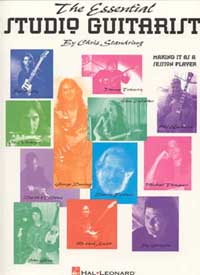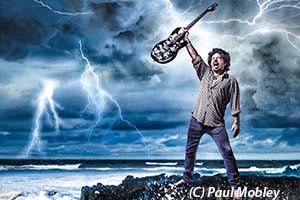
You'll find advice from such session greats as Steve Lukather, Michael Thompson, Tommy Tedesco, Phil Upchurch, Jay Graydon and many others. There's also a special section with sample studio charts and an in-depth interview with Dennis Budimer.
Steve Lukather
Essential factors: "The most important thing to have together is great time. Next to that you need to have a great sound. It helps if you are versatile, although most guys I know are in one bag or another, whether it be pop, rock, funk, or whatever. You also need to be quick at finding a creative guitar part that locks into the groove and brings the song to life. Showing off all your chops and licks will certainly not impress the producer, so definitely steer clear of that road!"
Challenging date: "Some time ago I was asked to do a date with an eighty-piece orchestra and live vocals. I remember Jeff Porcaro was also on the session. Now I'm certainly not the greatest reader, although I read okay. The pressure was on as we did all the cues in about two takes each. Something like eighty cues had to be recorded that day. Most of the charts were straight forward "variety" and I handled it fine. Then we took a break. When we came back we had to play cue M35 which was a sixteen bar cue in Db. The whole guitar part looked like an intense piano part. The conductor counted it off, and I found that I was the ONLY person playing. It was written as a solo intro. Frantically fumbling through it, I realized I had to get this together and fast! Panic set in as I saw about seventy-nine other heads turn. This is when all the other guys start to look at their watches, which is when paranoia really sets in. Still I got through it in the end and did a good job. That was the last time I took one of those reading-type sessions. Basically, I'm a record guy where I get called to do my thing."
Advice: "Forget everything you ever learned in school and follow your heart. There really is no school in the world that can prepare you for studio work. Experience is the key. I did hundreds of demo sessions when I started out, which is a great way to learn how to work under pressure and learn the craft. A good sense of humor is a great asset, and being personable to other guys around you will help. Make friends with everyone on the session without "brown nosing". A humbling approach will work. Be a nice guy as you just might not get a second chance. Most of all, GOOD LUCK!"
Hal.Leonard, The essential studio guitarist, 1994, ISBN 0-7935-2727-9




